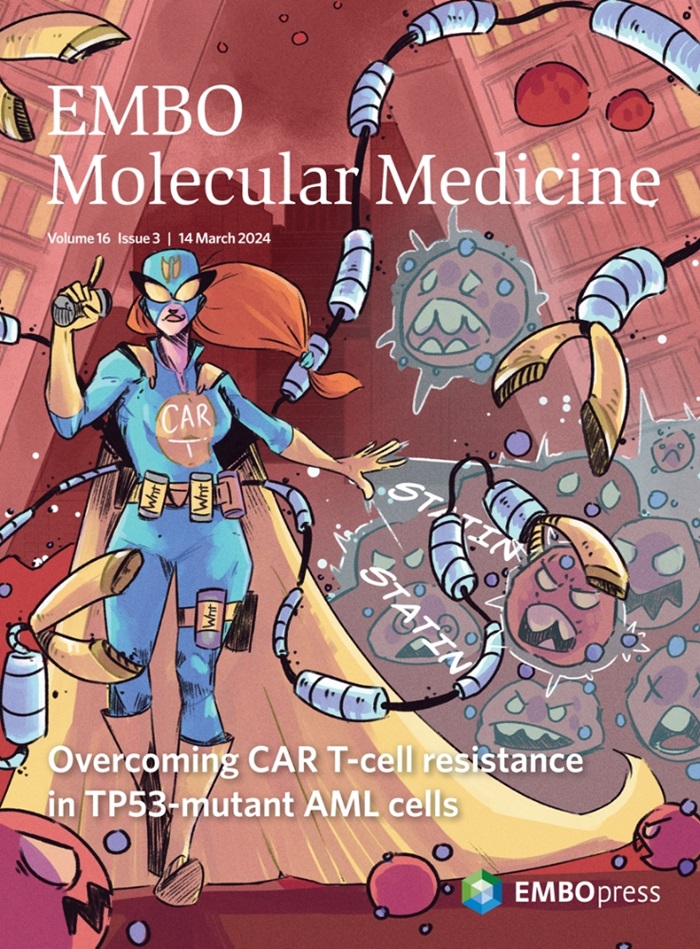EGFR控制KRASG12D结直肠癌的转录和代谢重布线。
IF 8.3
1区 医学
Q1 MEDICINE, RESEARCH & EXPERIMENTAL
引用次数: 0
摘要
抑制表皮生长因子受体(EGFR)在转移性结直肠癌(CRC)患者中显示出临床益处,但已知kras突变会产生耐药性。然而,最近的报道强调,EGFR是与RAS抑制剂共同抑制以有效治疗KRAS突变型CRC的关键靶点。在这里,我们通过建立具有关键CRC突变(KRAS, APC, TP53)和诱导EGFR缺失的小鼠CRC类器官,研究了EGFR在KRASG12D肿瘤中的肿瘤细胞内在贡献。代谢组学、转录组学和scrna分析显示,kras突变的类器官中EGFR的缺失降低了它们的表型异质性,并激活了与细胞大小减小和MAPK、PI3K和ErbB等主要信号级联下调相关的独特的癌症干细胞/WNT信号。这伴随着代谢重布线,糖酵解路线减少,并增加了折叠性谷氨酰胺水解。在机制上,在EGFR缺失后,Smoc2被确定为介导这些表型的关键上调靶点,这些表型可以在Smoc2的额外缺失后获救。患者数据集的验证显示,所识别的特征与RAS突变的CRC患者更好的总生存率相关,可能允许预测患者的治疗反应。本文章由计算机程序翻译,如有差异,请以英文原文为准。
EGFR controls transcriptional and metabolic rewiring in KRASG12D colorectal cancer.
Inhibition of the epidermal growth factor receptor (EGFR) shows clinical benefit in metastatic colorectal cancer (CRC) patients, but KRAS-mutations are known to confer resistance. However, recent reports highlight EGFR as a crucial target to be co-inhibited with RAS inhibitors for effective treatment of KRAS mutant CRC. Here, we investigated the tumor cell-intrinsic contribution of EGFR in KRASG12D tumors by establishing murine CRC organoids with key CRC mutations (KRAS, APC, TP53) and inducible EGFR deletion. Metabolomic, transcriptomic, and scRNA-analyses revealed that EGFR deletion in KRAS-mutant organoids reduced their phenotypic heterogeneity and activated a distinct cancer-stem-cell/WNT signature associated with reduced cell size and downregulation of major signaling cascades like MAPK, PI3K, and ErbB. This was accompanied by metabolic rewiring with a decrease in glycolytic routing and increased anaplerotic glutaminolysis. Mechanistically, following EGFR loss, Smoc2 was identified as a key upregulated target mediating these phenotypes that could be rescued upon additional Smoc2 deletion. Validation in patient-datasets revealed that the identified signature is associated with better overall survival of RAS mutant CRC patients possibly allowing to predict therapy responses in patients.
求助全文
通过发布文献求助,成功后即可免费获取论文全文。
去求助
来源期刊

EMBO Molecular Medicine
医学-医学:研究与实验
CiteScore
17.70
自引率
0.90%
发文量
105
审稿时长
4-8 weeks
期刊介绍:
EMBO Molecular Medicine is an open access journal in the field of experimental medicine, dedicated to science at the interface between clinical research and basic life sciences. In addition to human data, we welcome original studies performed in cells and/or animals provided they demonstrate human disease relevance.
To enhance and better specify our commitment to precision medicine, we have expanded the scope of EMM and call for contributions in the following fields:
Environmental health and medicine, in particular studies in the field of environmental medicine in its functional and mechanistic aspects (exposome studies, toxicology, biomarkers, modeling, and intervention).
Clinical studies and case reports - Human clinical studies providing decisive clues how to control a given disease (epidemiological, pathophysiological, therapeutic, and vaccine studies). Case reports supporting hypothesis-driven research on the disease.
Biomedical technologies - Studies that present innovative materials, tools, devices, and technologies with direct translational potential and applicability (imaging technologies, drug delivery systems, tissue engineering, and AI)
 求助内容:
求助内容: 应助结果提醒方式:
应助结果提醒方式:


